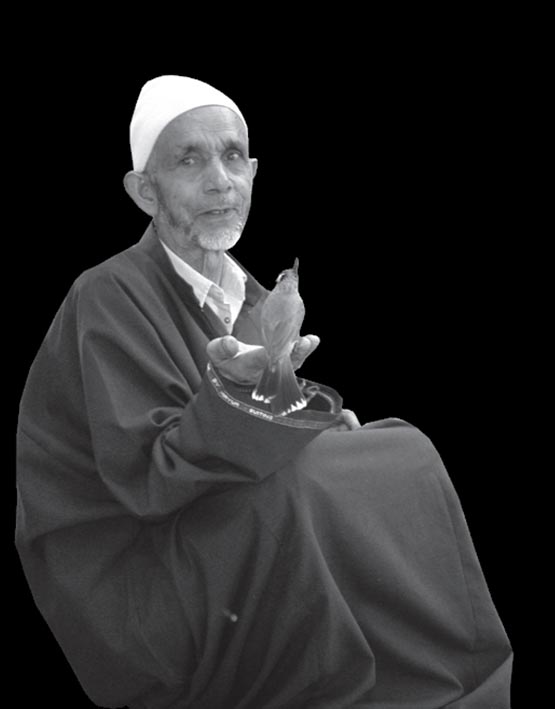Octogenarian Muhammad Akram writes poetry inspired by a pair of birds, who he says have been visiting him for the last 50 years. Akram tells Majid Maqbool that he understands their language.
 Outside a two storey house, surrounded by poplar trees and gurgling rivulets, a solitary bulbul comes down from a tree branch to rest on outstretched, waiting hand of an old man sitting under the tree. The man, Muhammad Akram, says the bulbul along with a black furred hazardastaan has been a regular visitor to his home in Akhal village some five kilometers from Pulwama. Thrice a day the birds leap from the trees – to rest on Akram’s palm.
Outside a two storey house, surrounded by poplar trees and gurgling rivulets, a solitary bulbul comes down from a tree branch to rest on outstretched, waiting hand of an old man sitting under the tree. The man, Muhammad Akram, says the bulbul along with a black furred hazardastaan has been a regular visitor to his home in Akhal village some five kilometers from Pulwama. Thrice a day the birds leap from the trees – to rest on Akram’s palm.This unusual meeting of two birds and an 88 year old man, according to Akram, has been a daily ritual since 1958. Though bulbuls have a 15-20 year lifespan, he claims the same bulbul has been visiting him for 50 years.
And by now Muhammad Akram Bulbul – as he likes to call himself – has written 11 books of poetry. In 1985 his collection of poetry, Bulbul-Hazardastaan, was broadcast on radio for 14 months. For him the bulbul and the hazardastan are like two muses that come to him everyday. “I owe my poetry to these two birds,” he says.
Wearing a brown pheran and a white prayer cap, the old man reclines besides a small tree near a snaking, noisy brook that passes by his home. And with a few grains in palm and hands stretched in prayer-like manner, he surveys the trees and calls the bulbul. Hearing him, the bulbul comes down, looks around, and slowly positions itself into his hand. Wings at rest and comfortable in his palm, the bird chirps for a while, and beaks a few grains. The old man mumbles something as if talking to the bird. And then the bulbul flies off, and disappears into the rich canopy of trees surrounding his house.
The black furred hazardastaan mostly visits him in the night, says Akram. Every visit of bulbul inspires to write poetry in Kashmiri. He says he can understand the voices that the bulbul – and the hazardastan who makes 1000 voices – make in his hand. Only he can understands it, he says, and later writes it down. Sometimes when he is ill and resting inside his room, the bulbul comes in through the small wooden door, and perches besides the pillow. “One bird sits on my right side and the other on the left,” the old man says gesticulating with his hands.
Akram recalls experiencing unusual things in his childhood. “When I was born, for five years I remember seeing fairies coming from the window of our home and taking me along. I would attempt to escape with them but my mother would not let me go,” he recalls.
After his mother’s death, he left school while in 5th standard, only to wander aimlessly for six months in forests, he says. “Then for 11 months, when I was in my twenties, I went to Cherar-e-sharief, but I was not happy and tried to commit suicide. I felt if I couldn’t get any contentment from this place, its better to end my life by jumping into a river,” he recalls. “I wrote a letter there that people shouldn’t come to this place, as I couldn’t get peace of mind there,” he says. “That day it was getting late and I fell asleep.” That night, Akram says, he saw a divine person in his dream. “That changed my life. The next morning I woke up and started writing about what I saw in my dream,” he recalls.
Akram often recites lines from his Kashmiri poetry he has written over the years – all inspired by the two birds. In the middle of our conversation, the bulbul comes inside the room, only to fly back to the trees. “Waloe waloe..pake..wala..pake jal…waloe wasu..waloe (come, come, come quickly, come down, come)…,” the old man says repeatedly to the bulbul. “He will come on my hand once I am outside,” he explains bulbul’s hesitation. And as he steps outside his home, the bulbul flies from one branch to another, preparing to come on his outstretched hands. The Hazardastaan remains perched on the tree, watching, Akram says.
He remembers a day in 1998 when he was not at home, and the bulbuls came all the way to Srinagar to find him. “They followed me, and constantly pecked at the window panes of the bus I was traveling in,” recalls Akram with a smile.
Akram believes the two birds possess soul of two pupils of a saint who lived in their village.
Akram gets visitors regularly who say he has healing powers. But he credits everything to Allah. His disciple Meema, was brought to his home with a half parlaysed body by her parents when she was 17. And she was unable to speak too, he says. There they say she heard his poetry and began to walk.















